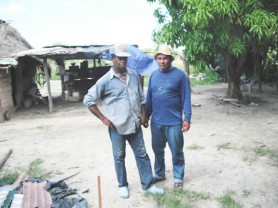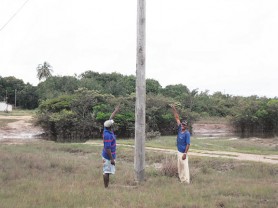Residents of the new housing scheme at Tabatinga, Rupununi are angry over what they say “is a waste of money,” being spent on one of the roads in their community.
Recently a contract was awarded by the Central Tender Board to upgrade some of the roads in the community, lay pipe mains and build a new road at the back of the community, to the tune of $117.2 million. The new road at the back of the community is the bone of contention.

The back of the community lies less than 50 metres from the edge of the Tabatinga creek, which flows along the community on its way to the Takutu River. All along this creek there are swamps with pagasse-type soil, which residents are contending erodes every time the rain falls.
When Stabroek News visited the area, one resident, Keith Cameron, pointed out where the marking for the new road cut into his land by some 50 feet. It was evident that Cameron, who has been living in the area for 30 years, stands to lose a considerable amount of fruit trees, some of them laden with fruits.
Another resident, Leonard Cyril pointed to the new road marking in the middle of his yard. He said the road will account for the loss of his “outside kitchen” and 50 feet of his land. From following the length of the road, it was clear that at least 15 occupied lots will be similarly affected.
Two other residents, Adolph Barran and Alex Scipio, showed this newspaper, by way of pointing to a spot on a lantern post, the level the water would rise to in the rainy season. The proposed road is less than 50 feet from the post and therefore would be swamped in the rainy season.
“This is a waste. I spoke to the regional chairman and he told me that he [did not have] the power to stop the road,” Barran said. “So I don’t know why Georgetown is still pushing this thing.”

Barran further pointed to a bridge that connects the two banks of the creek and informed SN that water would render that bridge useless in the rainy season. “In fact I operate a boat service right at that bridge in the high water [season],” he said.
Scipio informed this newspaper that when Central Housing and Planning Authority (CH&PA) took over house lot distribution from Land and Surveys Department in 2003, a general meeting was held with residents at the Arapaima Primary School, and they were given assurances that no one would be affected by CH&PA’s interventions. Scipio said CH&PA did several surveys during that time and now “dey taking away we land.”
When this newspaper contacted the officer in charge of Land and Surveys in Lethem, he said he knew for a fact that several persons were living in the area even before a decision was made to have the area designated a housing area. He said that when his department did its survey, it took care not to disrupt the livelihood of the early settlers. He said he knew the CH&PA did subsequent surveys but could not say what the new designs looked like since he was not privy to them. He could not say if the plans were registered with the Lands and Surveys Commission in Georgetown as is required. Several attempts to contact the CEO of CH&PA were unsuccessful.
When contacted, Regional Chairman of Region Nine (Upper Takutu/Upper Essequibo) Clarindo Lucas said he had held several formal and informal meetings with residents. He said he had advised them not to build until the plans were finalized.
Lucas said that at least four different surveys were done by CH&PA and the present one was the best option when everything was considered. This newspaper has seen the plan which revealed that surveys started on December 12, 2005 and were completed on May 24, 2006.
When asked about the residents’ claims in relation to the high water, Lucas said he would speak to the authorities with a view to having them re-allocate the money for that road into something more useful.
Meanwhile, residents said that should the authorities go ahead and build the road they would have to be compensated for the land they would lose.
“I am now old. I invested a lot of my youth and money on my land, that is my pension,” Cameron, who is a retired public servant, said.





